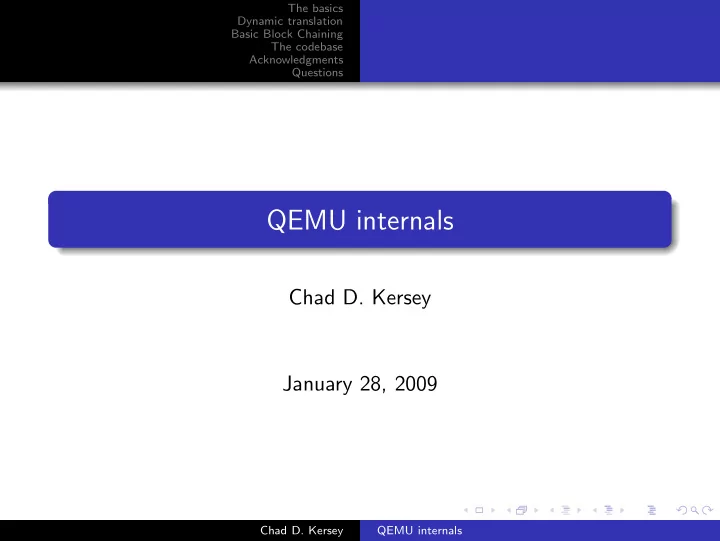

The basics Dynamic translation Basic Block Chaining The codebase Acknowledgments Questions QEMU internals Chad D. Kersey January 28, 2009 Chad D. Kersey QEMU internals
The basics Dynamic translation Basic Block Chaining The codebase Acknowledgments Questions Where to get the source svn co svn://svn.savannah.nongnu.org/qemu Make sure you have the latest sources if you’re reading along. A lot has changed since the previous release. Chad D. Kersey QEMU internals
The basics Dynamic translation Basic Block Chaining The codebase Acknowledgments Questions Functional simulation Simulate what a processor does, not how it does it. Needs separate model for timing analysis (if needed). Faster than “cycle-accurate” simulators. Good enough to use applications written for another CPU. Chad D. Kersey QEMU internals
The basics Dynamic translation Basic Block Chaining The codebase Acknowledgments Questions QEMU system simulation QEMU simulates VGA, serial, and ethernet. hw/* contain all of the supported boards. Includes rather complete PC, Nokia N-series, PCI ultrasparc. Various development boards in varying levels of completion. Chad D. Kersey QEMU internals
The basics Dynamic translation Basic Block Chaining The codebase Acknowledgments Questions What dynamic translation isn’t Interpreters execute instructions one at a time. Significant slowdown from constant overhead. Easier to write and debug than dynamic translators. Guest Code Static Code Control Flow Data Flow Chad D. Kersey QEMU internals
The basics Dynamic translation Basic Block Chaining The codebase Acknowledgments Questions What dynamic translation is Dynamic translators convert code as needed. Try to spend most time executing in translation cache. Translate basic blocks as needed. Store translated blocks in code cache. Translation Cache . Generated Code . Guest Code Static Code . . . . Control Flow Data Flow Chad D. Kersey QEMU internals
The basics Dynamic translation Basic Block Chaining The codebase Acknowledgments Questions Getting into and out of the code cache cpu exec() called each time around main loop. Program executes until an unchained block is encountered. Returns to cpu exec() through epilogue. Pre−generated code Translation Cache Prologue . Code . cpu_exec() . Epilogue . . . Chad D. Kersey QEMU internals
The basics Dynamic translation Basic Block Chaining The codebase Acknowledgments Questions Portable dynamic translation Guest Code QEMU uses an gen_intermediate_code() intermediate form. Frontends are in TCG Operations target-*/ Backends are in tcg/*/ Selected with preprocessor tcg_gen_code() evil. Host Code Chad D. Kersey QEMU internals
The basics Dynamic translation Basic Block Chaining The codebase Acknowledgments Questions Portable dynamic translation: stage 1 push %ebp Guest Code mov %esp,%ebp not %eax add %eax,%edx mov %edx,%eax gen_intermediate_code() xor $0x55555555,%eax pop %ebp ret TCG Operations tcg_gen_code() Host Code Chad D. Kersey QEMU internals
The basics Dynamic translation Basic Block Chaining The codebase Acknowledgments Questions Portable dynamic translation: stage 2 . . . Guest Code ld_i32 tmp2,env,$0x10 qemu_ld32u tmp0,tmp2,$0xffffffff ld_i32 tmp4,env,$0x10 movi_i32 tmp14,$0x4 gen_intermediate_code() add_i32 tmp4,tmp4,tmp14 st_i32 tmp4,env,$0x10 st_i32 tmp0,env,$0x20 movi_i32 cc_op,$0x18 TCG Operations exit_tb $0x0 tcg_gen_code() Host Code Chad D. Kersey QEMU internals
The basics Dynamic translation Basic Block Chaining The codebase Acknowledgments Questions Portable dynamic translation: stage 3 . . . Guest Code mov 0x10(%ebp),%eax mov %eax,%ecx mov (%ecx),%eax mov 0x10(%ebp),%edx gen_intermediate_code() add $0x4,%edx mov %edx,0x10(%ebp) mov %eax,0x20(%ebp) mov $0x18,%eax TCG Operations mov %eax,0x30(%ebp) xor %eax,%eax jmp 0xba0db428 tcg_gen_code() /*This represents just the ret instruction!*/ Host Code Chad D. Kersey QEMU internals
The basics Dynamic translation Basic Block Chaining The codebase Acknowledgments Questions Basic block chaining Returning from code cache is slow. Solution: jump directly between basic blocks! Make space for a jump, follow by a return to the epilogue. Every time a block returns, try to chain it. Pre−generated code Translation Cache TB Prologue cpu_exec() TB TB Epilogue TB Chad D. Kersey QEMU internals
The basics Dynamic translation Basic Block Chaining The codebase Acknowledgments Questions Basic block chaining: step 1 Pre−generated code Translation Cache TB Prologue cpu_exec() TB TB Epilogue TB Chad D. Kersey QEMU internals
The basics Dynamic translation Basic Block Chaining The codebase Acknowledgments Questions Basic block chaining: step 2 Pre−generated code Translation Cache TB Prologue cpu_exec() TB TB Epilogue TB Chad D. Kersey QEMU internals
The basics Dynamic translation Basic Block Chaining The codebase Acknowledgments Questions Basic block chaining: step 3 Pre−generated code Translation Cache TB Prologue cpu_exec() TB TB Epilogue TB Chad D. Kersey QEMU internals
The basics Dynamic translation Basic Block Chaining The codebase Acknowledgments Questions Basic block chaining: step 4 Pre−generated code Translation Cache TB Prologue cpu_exec() TB TB Epilogue TB Chad D. Kersey QEMU internals
The basics Dynamic translation Basic Block Chaining The codebase Acknowledgments Questions Basic block chaining: step 5 Pre−generated code Translation Cache TB Prologue cpu_exec() TB TB Epilogue TB Chad D. Kersey QEMU internals
The basics Dynamic translation Basic Block Chaining The codebase Acknowledgments Questions Unchain on interrupt Now how do we interrupt the processor? Have another thread unchain the blocks. cpu_interrupt() Pre−generated code Translation Cache TB Prologue cpu_exec() TB TB Epilogue TB Chad D. Kersey QEMU internals
The basics Dynamic translation Basic Block Chaining The codebase Acknowledgments Questions Code organization TranslationBlock structure in translate-all.h Translation cache is code gen buffer in exec.c cpu-exec() in cpu-exec.c orchestrates translation and block chaining. target-*/translate.c : guest ISA specific code. tcg-*/*/ : host ISA specific code. linux-user/* : Linux usermode specific code. vl.c : Main loop for system emulation. hw/* : Hardware, including video, audio, and boards. Chad D. Kersey QEMU internals
The basics Dynamic translation Basic Block Chaining The codebase Acknowledgments Questions Ways to have fun Add extra instructions to an ISA. Generate execution traces to drive timing models. Try to integrate timing models. Retarget frontend or backend. Improve optimization, say, by retaining chaining across interrupts. Chad D. Kersey QEMU internals
The basics Dynamic translation Basic Block Chaining The codebase Acknowledgments Questions Acknowledgments QEMU by Fabrice Bellard: www.bellard.org/ Current qemu-internals: http://bellard.org/qemu/qemu-tech.html Some graphics in these slides part of work funded by DOE grant. Chad D. Kersey QEMU internals
The basics Dynamic translation Basic Block Chaining The codebase Acknowledgments Questions Questions? ? Chad D. Kersey QEMU internals
Recommend
More recommend